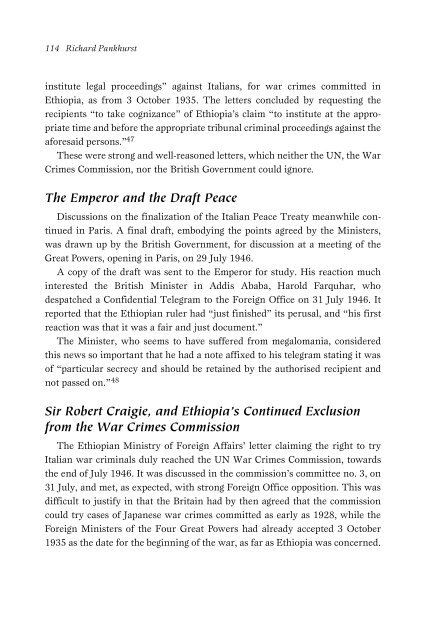Italian Fascist War Crimes in Ethiopia - Societa italiana di storia ...
Italian Fascist War Crimes in Ethiopia - Societa italiana di storia ...
Italian Fascist War Crimes in Ethiopia - Societa italiana di storia ...
You also want an ePaper? Increase the reach of your titles
YUMPU automatically turns print PDFs into web optimized ePapers that Google loves.
114 Richard Pankhurst<br />
<strong>in</strong>stitute legal proceed<strong>in</strong>gs” aga<strong>in</strong>st <strong>Italian</strong>s, for war crimes committed <strong>in</strong><br />
<strong>Ethiopia</strong>, as from 3 October 1935. The letters concluded by request<strong>in</strong>g the<br />
recipients “to take cognizance” of <strong>Ethiopia</strong>’s claim “to <strong>in</strong>stitute at the appropriate<br />
time and before the appropriate tribunal crim<strong>in</strong>al proceed<strong>in</strong>gs aga<strong>in</strong>st the<br />
aforesaid persons.” 47<br />
These were strong and well-reasoned letters, which neither the UN, the <strong>War</strong><br />
<strong>Crimes</strong> Commission, nor the British Government could ignore.<br />
The Emperor and the Draft Peace<br />
Discussions on the f<strong>in</strong>alization of the <strong>Italian</strong> Peace Treaty meanwhile cont<strong>in</strong>ued<br />
<strong>in</strong> Paris. A f<strong>in</strong>al draft, embody<strong>in</strong>g the po<strong>in</strong>ts agreed by the M<strong>in</strong>isters,<br />
was drawn up by the British Government, for <strong>di</strong>scussion at a meet<strong>in</strong>g of the<br />
Great Powers, open<strong>in</strong>g <strong>in</strong> Paris, on 29 July 1946.<br />
A copy of the draft was sent to the Emperor for study. His reaction much<br />
i n t e rested the British M<strong>in</strong>ister <strong>in</strong> Ad<strong>di</strong>s Ababa, Harold Fa rq u h a r, who<br />
despatched a Confidential Telegram to the Foreign Office on 31 July 1946. It<br />
reported that the <strong>Ethiopia</strong>n ruler had “just f<strong>in</strong>ished” its perusal, and “his first<br />
reaction was that it was a fair and just document.”<br />
The M<strong>in</strong>ister, who seems to have suffered from megalomania, considered<br />
this news so important that he had a note affixed to his telegram stat<strong>in</strong>g it was<br />
of “particular secrecy and should be reta<strong>in</strong>ed by the authorised recipient and<br />
not passed on.” 48<br />
Sir Robert Craigie, and <strong>Ethiopia</strong>’s Cont<strong>in</strong>ued Exclusion<br />
from the <strong>War</strong> <strong>Crimes</strong> Commission<br />
The <strong>Ethiopia</strong>n M<strong>in</strong>istry of Foreign Affairs’ letter claim<strong>in</strong>g the right to try<br />
<strong>Italian</strong> war crim<strong>in</strong>als duly reached the UN <strong>War</strong> <strong>Crimes</strong> Commission, towards<br />
the end of July 1946. It was <strong>di</strong>scussed <strong>in</strong> the commission’s committee no. 3, on<br />
31 July, and met, as expected, with strong Foreign Office opposition. This was<br />
<strong>di</strong>fficult to justify <strong>in</strong> that the Brita<strong>in</strong> had by then agreed that the commission<br />
could try cases of Japanese war crimes committed as early as 1928, while the<br />
Foreign M<strong>in</strong>isters of the Four Great Powers had already accepted 3 October<br />
1935 as the date for the beg<strong>in</strong>n<strong>in</strong>g of the war, as far as <strong>Ethiopia</strong> was concerned.

















